Can you act simply by lying in one place and breathing? Sam Heughan proved the answer is a gut-wrenching yes in Outlander Season 3’s episode 1.
Outlander fans expecting the full-on screams and gun shots of battle after the last strains of the “Skye Boat Song” died away instead were met in the opening episode of Season 3 with silence. Utter, breathtaking, heart-wrenching silence. As the camera scrolled past the body parts and dead men piled up like so many rag dolls in an abandoned heap, the only sound—and a faint one at that—was that of the wind. It was so eerily quiet, in fact, that when a Redcoat soldier carelessly tossed a flag on a cart, it pierced like cannon shot, its contrast to the void was that startling.
Our journey in silence continued as the camera panned the scene. A minute or so into the episode, we heard some Redcoats in the background as they walked about the battlefield looking for the living so they could either finish them off (if they were Scottish) or get them help if they were English. The camera panned slowly until it rested on the face of Jamie Fraser where the only hint that he was, indeed, not dead, was his first ragged breath. And as Jamie’s eyes slowly fluttered open, we watched with him as he realized with full horror that he was, in fact, still alive.
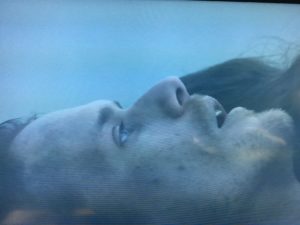
Jamie takes one ragged breath…and then…slowly….reluctantly another. His eyes flutter and we join him in flashbacks as he relives the battle of Culloden—his brief encounter with Murtagh, his pleading with the Bonnie Prince, his sweet moment smelling Claire’s cloak after she’s gone through the stones and, yes, the final epic battle with his nemesis, Black Jack Randall. We are there with him each ragged breath after another.
While telling a war story in such a quiet way might seem counterintuitive, showrunner and episode writer Ron D. Moore’s ultimate choice to go inward, to focus on the small rather than the battle writ large, was brilliant. Breath is literally our life force. It is the first thing that tells everyone we are alive. Anxious parents and medical staff alike wait to hear that first full breath and wail that proclaim of, yes, this child is here! And it is the last thing we literally hear—that final rasping breath, the death rattle—until we hear no more.
By choosing to create an almost silent world, Moore brings us in to “The Battle Joined“ with a bomb far louder than any battle melee. He brings us in to the sound of devastation, and with that silence he unites the audience and Jamie. We hear what Jamie is hearing. We are—quite literally—in the nothingness. We are hearing what Jamie hopes is death. And we are there with him.
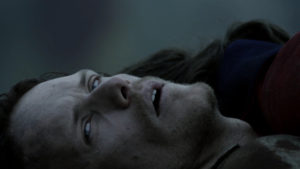
Of course, others in the cast use their breath as an acting tool in general, and in this episode, in particular. Claire stops short to watch the small bird outside her window, and in those few moments before her ability to use her breath as a focus of power is—literally—taken away from her, Claire uses her breath as a source of power and strength.
But it is Sam Heughan, who doesn’t even speak the first of only a few lines in the whole episode—“Leave me be”—until a good 15 minutes into the episode, who absolutely stars in his use of breath here. His breath hitches. He gasps. He rattles. He barely breathes. And through it all, we do it with him. Because it is the rare person who hasn’t experienced at least one moment in their lives when they breathed like that, a moment when they wished they would, perhaps, not breathe again.
It is in choosing to use breath this way that Moore brings home the other overarching message of this episode and, to some extent, Outlander in general. We may think we can control what happens but, like our breath—and our heart and our brain—our control is fleeting and superficial.
That’s because our breath, like our heart and brain, is part of the autonomous nervous system. That’s the part of our nervous system that can’t be controlled by our will. We can impact them to some extent through outer influences such as what we eat (or don’t) or even hurting ourselves with implements, but we can’t make ourselves stop breathing by holding our breath.
When you think of it, that physiology is a brilliant move by God/Mother Nature/Whatever Universal Life Force You Choose. Because most of us have had moments when we thought—sometimes correctly, sometimes not—that we couldn’t go on, that there was no point in continuing to try. They are moments when our grief or pain was so deep that anything seemed better than taking another step.
And yet we did, because we had to. Because our hearts kept beating and our next breath came after the last one, and while our body kept going, we somehow dug deep to figure out where to go next and how to get there.
Understanding that ultimate lack of control is the underlying final message in this episode. Just as Jamie and Claire tried time and time again in Season 2 to stop the tide of time, to thwart history’s course, ultimately they could—like the breath you can hold while swimming or if something hurts—only do it for a short limited time, in a narrow small way.
And so Jamie and Claire must learn how to go on. It is the journey of Voyager—that learning how to go on, to craft a life when you think you couldn’t possibly. And, thanks to Moore, we are right there walking with them, breath by desperate breath.
What did you think of the quiet way Ron D. Moore handled “The Battle Joined”? Can you think of other examples of breathing being used to convey desperation in Outlander so far?


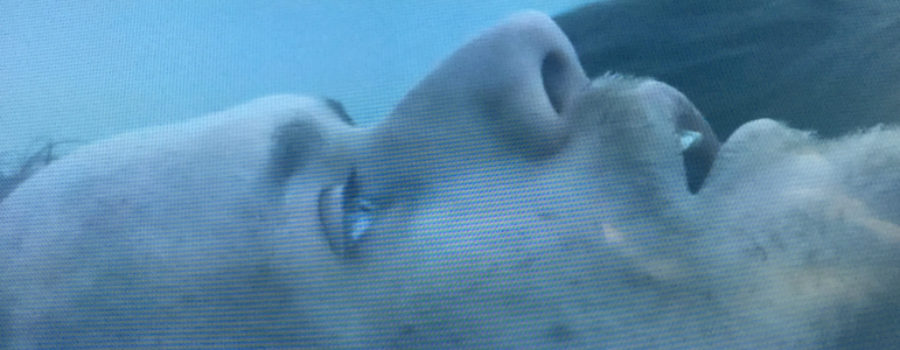




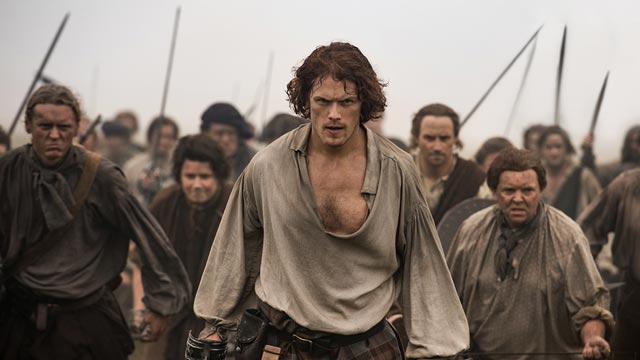
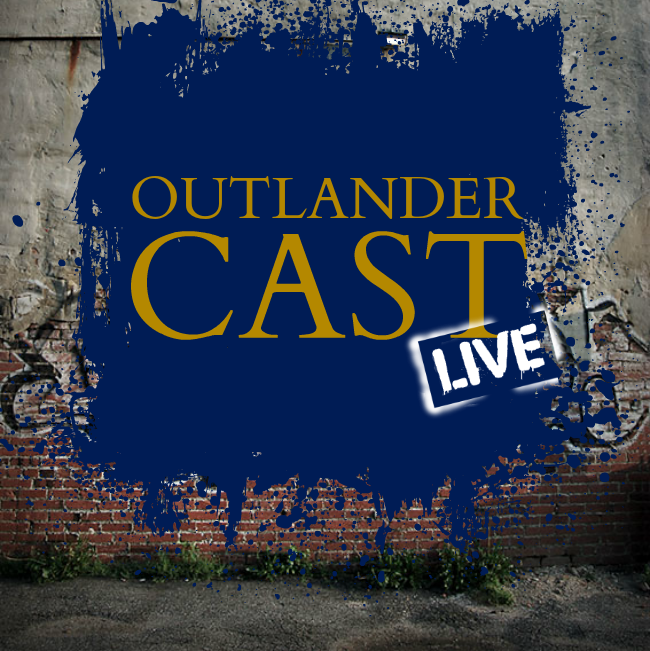




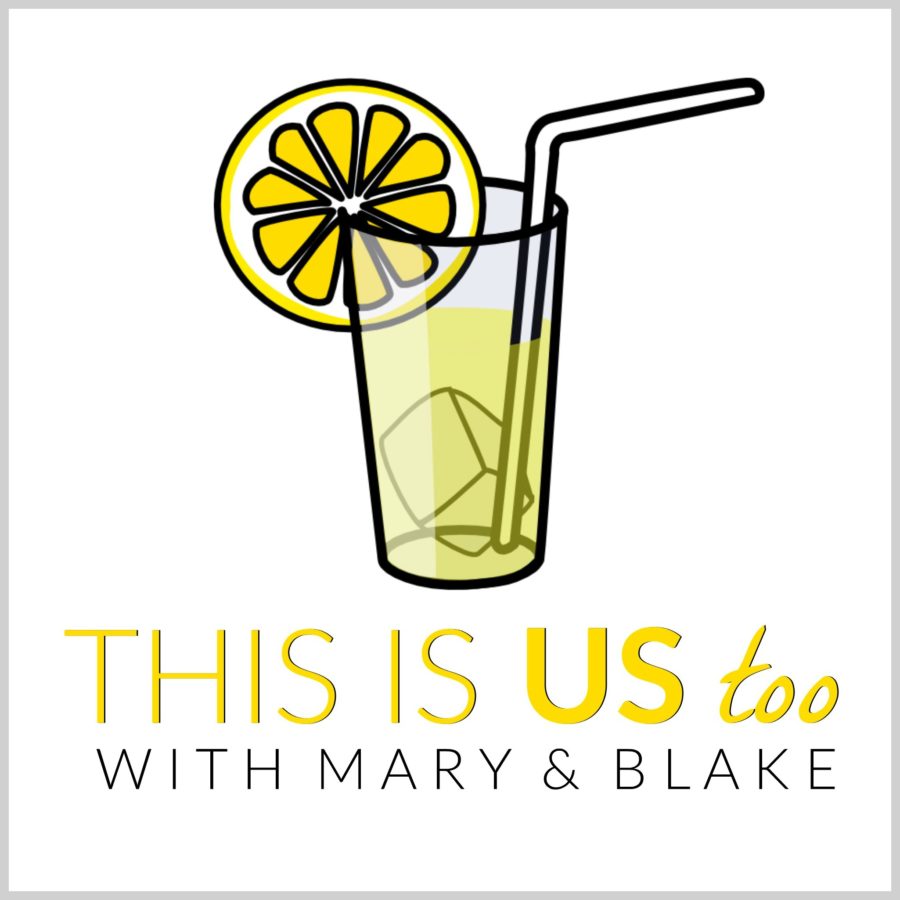

48 Comments
Leave your reply.